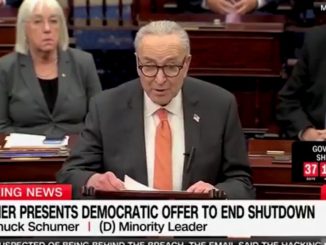
| Published July 3, 2025
WASHINGTON, D.C. — In a stunning setback for former President Donald Trump and House Republican leadership, a high-stakes procedural vote on the so-called “Big Beautiful Bill” collapsed late Tuesday night after four GOP defections, leaving one of the most ambitious conservative legislative pushes of 2025 in limbo. Despite weeks of pressure from Trump and Speaker Mike Johnson, internal party fractures—particularly over spending levels and entitlement cuts—proved too deep to overcome, halting momentum just days before Trump’s self-imposed July 4 deadline to sign the bill into law.
Vote breakdown:
-
Rep. Republicans: 203 Yea, 4 Nay
-
Democrats: 212 Yea
-
Outcome: Procedural motion fails, effectively halting progress
The four GOP “no” votes were:
-
Keith Self
-
Andrew Clyde
-
Victoria Spartz
-
Brian Fitzpatrick
These defections reflected deep unease over the Senate’s rollback of House-level spending cuts (especially in Medicaid and SNAP) and ballooning deficits.
- Democrats: 212 Nay
- Total: 203 Yea, 216 Nay
- 13 Not Voting
#BREAKING: Republicans no longer have the votes to advance Trump’s “Big Beautiful Bill,” as Democrats erupt in cheers and celebrate the sudden shift on the House floor pic.twitter.com/ca1D3sDitj
— R A W S A L E R T S (@rawsalerts) July 3, 2025
🔄 What’s Next in the Congressional Drama
-
The failure to advance Trump’s “Big Beautiful Bill” has thrown the GOP-controlled House into disarray, and what comes next could determine the trajectory of Trump’s legislative influence in his post-presidency comeback bid. Several key dynamics are now unfolding:
1. Leadership Scrambles to Regain Control
Speaker Mike Johnson and his leadership team are reportedly preparing a revised version of the bill that could win over the four GOP defectors and appease the larger House Freedom Caucus. Behind closed doors, negotiations have intensified, with leadership considering tweaks to the entitlement cuts, particularly on Medicaid and food assistance, that sparked backlash from both moderates and fiscal hawks.
2. Pressure from Trump Mounts
Former President Trump remains deeply invested in the bill’s success and has turned up the heat on dissenting Republicans, both privately and through public statements. At a recent rally in Pennsylvania, Trump called on GOP members to “put America first or step aside,” a not-so-subtle warning that primary challenges could await holdouts. Some lawmakers close to Trump have floated the possibility of further political consequences for those who block the bill.
3. Freedom Caucus Stands Firm
The House Freedom Caucus remains a significant obstacle. Members such as Chip Roy, Lauren Boebert, and Thomas Massie are digging in, demanding deeper spending cuts and more transparency in how the bill will affect the federal deficit. Their refusal to support the Senate-modified version—which they view as bloated and unprincipled—makes it difficult for Johnson to rely solely on Republican votes.
4. Democrats Watching—and Waiting
Democrats, while generally opposed to the bill, have been united in their strategy of allowing Republican divisions to play out. Some moderates on the Democratic side have expressed a willingness to negotiate if major concessions are made—especially on social programs—but Democratic leaders are likely to resist helping pass a bill so closely tied to Trump’s brand.
5. Clock Ticking on Trump’s July 4 Deadline
Time is not on the Republicans’ side. Trump has repeatedly stated he wants the bill signed by Independence Day, framing it as a symbol of national renewal. But with Congress now stalled, and members fatigued from marathon sessions, it’s increasingly likely that any resolution will slip into the following week. Each day that passes without action risks further eroding GOP unity and public confidence.
6. Potential for a Slimmed-Down Deal
Some in leadership are floating the idea of breaking the “megabill” into smaller, standalone pieces that could be passed more easily. These may include a trimmed-down tax reform bill, a separate infrastructure package, and a more modest spending reform plan. However, that strategy risks angering Trump, who wants a single, sweeping legislative victory to cement his renewed political dominance.
⚖️ Implications: What This Setback Signals
The collapse of the House procedural vote on Trump’s “Big Beautiful Bill” is more than a momentary legislative failure—it’s a reflection of deeper fractures within the Republican Party and a potential warning sign for Trump’s political momentum heading into the next phase of his agenda.
1. Fractured GOP Unity
The inability to hold together a slim majority, despite Trump’s direct involvement, underscores how divided Republicans remain on core policy issues like federal spending, entitlement reform, and executive influence. For all the talk of a unified “America First” movement, the four GOP defections—combined with hardline Freedom Caucus resistance—show a party still navigating its identity in the Trump era.
2. Diminished Trump Leverage
While Trump continues to wield major influence in Republican primaries and media cycles, the failure to push through his signature bill raises questions about his effectiveness as a legislative force. His campaign-style pressure tactics may still resonate with the base, but they seem less persuasive inside the Capitol—particularly with members wary of political backlash over deep budget cuts.
3. Economic and Budgetary Uncertainty
The bill’s failure adds to economic uncertainty, especially since it was tied to sweeping tax reforms, infrastructure investments, and spending adjustments. Markets had already begun pricing in elements of the legislation, and now face ambiguity on whether any significant fiscal package will materialize. Meanwhile, deficit hawks warn that the Senate-passed version’s projected $1 trillion in additional debt could now be revisited—or completely reshaped.
4. Electoral Fallout Ahead
Democrats are seizing the moment to portray the bill as both unpopular and fiscally reckless. Polls show mixed public support, especially around proposed cuts to Medicaid and SNAP. Should Republicans continue pushing without bipartisan input, they may face electoral consequences in suburban and swing districts during the 2026 midterms. Conversely, failure to pass anything may also demoralize the GOP base.
5. Precedent for Future Legislative Showdowns
This vote could set a tone for future clashes in a divided and increasingly volatile Congress. If Trump-aligned lawmakers cannot pass sweeping legislation even under GOP control, it may embolden Democrats and weaken Republican leverage in negotiations on future appropriations bills, immigration reforms, or judicial confirmations.
 Overall Takeaway: A Moment of Reckoning for Trump’s GOP
Overall Takeaway: A Moment of Reckoning for Trump’s GOP
The failure to advance the “Big Beautiful Bill” reveals more than just a legislative misstep—it exposes the fragile balancing act within today’s Republican Party. Despite former President Trump’s dominance in conservative politics, his flagship proposal has stumbled on the very turf he once controlled. With internal dissent, fiscal concerns, and political fatigue mounting, GOP leaders now face a critical choice: bend to factional demands, seek bipartisan compromise, or risk watching one of their biggest post-Trump victories unravel.
As Independence Day approaches, so too does a deadline—not just for a bill, but for the broader question of whether Trump’s revived legislative vision can survive the grind of governance. For now, the House is stalled, the bill is in limbo, and the political fallout is just beginning.





Be the first to comment